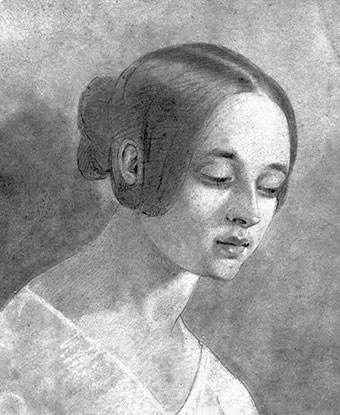Last updated: September 27, 2017
Person
Virginia Clemm Poe

Courtesy, The Lilly Library, Indiana University, Bloomington, Indiana
Described as having bright eyes, and dark brown hair, Virginia’s face was “always animated and vivacious.” Virginia lived in Baltimore with her grandmother, mother, and cousin William Henry Poe (Edgar’s brother). Virginia’s father died when she was four years old. Afterwards the family depended on the grandmother's small government pension of $240, which she received each year for her husband's service during the American Revolution. Edgar moved in with the family in early 1831 and would remain with them until he moved to Richmond, Virginia in 1835. Virginia’s grandmother died in the same year leaving her and her mother Maria, without a steady source of income.
Virginia and Maria joined Edgar in Richmond in 1835. Edgar and Virginia were married in 1836. She was 13 years old and he was 27 years old. In 1842, Virginia became ill with tuberculosis. She died of the disease on January 30, 1847, at the age of 24.
Valentine to her Husband
On Valentine’s Day in 1846, Virginia wrote this acrostic poem to her husband. Note that the first letter of each line spells out his name.Ever with thee I wish to roam—
Dearest my life is thine.
Give me a cottage for my home
And a rich old cypress vine,
Removed from the world with its sin and care
And the tattling of many tongues.
Love alone shall guide us when we are there—
Love shall heal my weakened lungs;
And Oh, the tranquil hours we’ll spend,
Never wishing that others may see!
Perfect ease we’ll enjoy, without thinking to lend
Ourselves to the world and its glee—
Ever peaceful and blissful we’ll be.
My Little Darling Wife
Edgar Allan Poe to Virginia Clemm Poe, New York City, June 12, 1846.My Dear Heart, My dear Virginia! Our Mother will explain to you why I stay away from you
this night. I trust the interview I am promised, will result in some substantial good for me, for
your dear sake, and hers—Keep up your heart in all hopefulness, and trust yet a little longer—In my last great disappointment, I should have lost my courage but for you—my little darling wife you are my greatest and only stimulus now. To battle with this uncongenial, unsatisfactory and ungrateful life—I shall be with you tomorrow P.M. and be assured until I see you, I will keep in loving remembrance your last words and your fervent prayer!
Sleep well and may God grant you a peaceful summer, with your devoted
Edgar
My Poor Virginia Still Lives
Edgar Allan Poe to Marie L. Shew, Fordham, New York, January 29, 1847.Kindest—dearest friend—My poor Virginia still lives, although failing fast and now suffering
much pain. May God grant her life until she sees you and thanks you once again! Her bosom is full to overflowing—like my own—with a boundless—inexpressible gratitude to you. Lest she may never see you more—she bids me say that she sends her sweetest kiss of love and will die blessing you. But come—oh come to-morrow! Yes, I will be calm—everything you so nobly wish to see me. My mother sends you, also, her "warmest love and thanks." She begs me to ask you, if possible, to make arrangements at home so that you may stay with us tomorrow night. I enclose the order to the Postmaster.
Heaven bless you and farewell
Edgar A Poe
Her Life Was Despaired Of
Excerpt from Edgar Allan Poe's letter to George W. Eveleth, Fordham, New York ,January 4, 1848.Six years ago, a wife, whom I loved as no man ever loved before, ruptured a blood-vessel insinging. Her life was despaired of. I took leave of her forever & underwent all the agonies of her death. She recovered partially and I again hoped. At the end of a year the vessel broke again—I went through precisely the same scene. Again in about a year afterward. Then again—again—again & even once again at varying intervals. Each time I felt all the agonies of her death—and at each accession of the disorder I loved her more dearly & clung to her life with more desperate pertinacity. But I am constitutionally sensitive—nervous in a very unusual degree. I became insane, with long intervals of horrible sanity. During these fits of absolute unconsciousness I drank, God only knows how often or how much. As a matter of course, my enemies referred the insanity to the drink rather than the drink to the insanity. I had indeed, nearly abandoned all hope of a permanent cure when I found one in the death of my wife. This I can & do endure as becomes a man—it was the horrible never-ending oscillation between hope & despair which I could no longer have endured without the total loss of reason. In the death of what was my life, then, I receive a new but—oh God! How melancholy an existence.”
